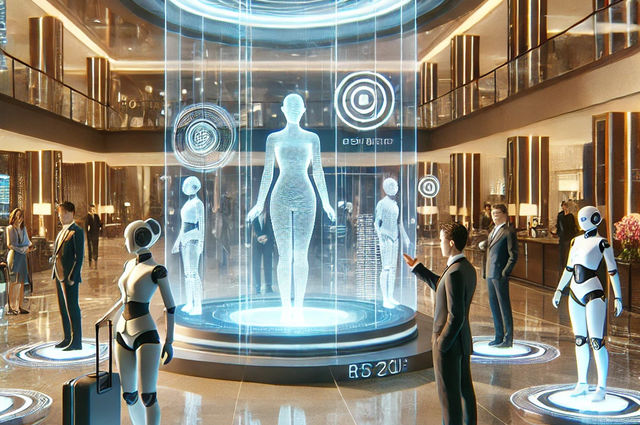Digital Workers in Hospitality – What Does the Future Hold?
10 experts shared their view
As automation, robotics, and AI continue to advance at breakneck speed, the role of digital workers is reshaping industries across the board.
Take Amazon, for instance: robots now account for nearly half of its workforce, with over 750,000 robotic units working alongside 1.55 million human employees.
Unlike Amazon's efficiency-focused model, however, our industry thrives on human connection and personalized service. The real challenge for us lies in determining how to integrate technological efficiency without losing the authentic human touch that defines the guest experience.
What's your take? Could we see digital workers comprising half of the hospitality workforce, as they already do at Amazon in this decade? Which departments are most likely to see this transformation first? And how can the industry prepare to adopt these changes while safeguarding the very essence of hospitality?
By 2025, over 85 million existing jobs will be lost due to the seismic shift toward AI, robotization and automation, according to WEF, McKinsey and OECD. Last year labor costs exceeded 1/3 of hotel revenue and AI, robotization and automation are becoming increasingly appealing to hotel owners and operators.
Whether we like it or not: robotization and automation are coming even to our technology-averse hospitality industry. Digital workers in the form of robots are being used at thousands of hotels worldwide and already replace numbers of hospitality employees in performing dangerous, repetitive and mundane jobs like housekeepers, porters and baggage handlers, concierges, security guards, line cooks, room service, bar tenders, waiters, etc.
Next gen technologies like AI, robotics, automation are solving a number of issues in our industry:
- Solve dull, repetitive, dirty or dangerous jobs.
- Solve high turnover of trained employees (20%-30%)
- Lower labor costs
- Increase productivity
- Solve labor shortages
A few examples of robot implementations:
Housekeeping robots Rosie by Tailos clean guest rooms 20 percent faster and public areas up to 80 percent faster than human housekeepers.
Keenon Robotics has deployed 100,000 waiter, cleaning and but,er robots to 60 countries worldwide.
Could we see digital workers comprising half of the hospitality workforce, as they already do at Amazon in this decade?
Yes. This model aligns perfectly with the limited and select service layer of the industry. Under such a model I would call it the 'no service' or dormitory management layer. Although beauty is in the eye of the beholder.
Which departments are most likely to see this transformation first?
Following the above, elimination of the overall front of house function with automation from reservation to billing. The model will migrate to a pre-payment model with no other products provided on site to purchase or (more) vending machines. All on site functions will follow including engineering and elements of housekeeping.
How can the industry prepare to adopt these changes while safeguarding the very essence of hospitality?
Under the model above that is not the objective. The objective is the removal of human manpower. In reality the current manpower exists for show in this layer of industry. There will be a skeleton property management/guest contact function for very lmited human touch points. The customer may even be charged to work with a human!
Get ready!
To thrive in an increasingly digital world, hotels must embrace AI to deliver the highly personalized experiences modern guests demand. However, as with any transformation, it's critical not to put the cart before the horse. Before investing in advanced AI-driven solutions, hotels should first establish a strong, sustainable data foundation—a Central Guest Profile (CGP) that aggregates guest information across all touchpoints of the customer journey.
Without clean, centralized data, AI will underperform, resulting in poor personalization and reduced ROI. Think of ChatGPT: its strength lies not only in advanced algorithms but also in vast, high-quality datasets that enable accurate, meaningful responses. Many hotels today lag behind OTAs and e-commerce giants like Amazon in their ability to personalize content on websites and newsletters. The root cause is clear—fragmented data and a lack of centralized guest knowledge.
Departments such as marketing, reservations, and guest services will likely lead the adoption of digital workers, particularly in areas where routine tasks can be automated without compromising guest experience. As the hotel industry evolves, it's essential to address these foundational issues before chasing "fancy" solutions. Only then can AI truly help hotels differentiate themselves, drive direct bookings, and enhance guest loyalty.
We've watched the first truly productive use of AI in robotics in our properties as a start. Always routine tasks so far, including room floor cleaning, roof and window cleaning, large function room cleaning and more. Delivery of items to the room looks nice but is more of an early adapter gee whiz item than one with true payback in productivity.
I've observed another AI revolution though, in the back office, just starting to show its strength. Completely automated handling of accounts payable for groups and chains where invoices and purchase orders are sent electronically and automatically injested into the large company accounting systems for one. The same is begingning to be true for smaller groups and even some individual properties on the cutting edge: requiring vendors to send documents electronically for ingestion into lesser local accounting systems.
Watch for decision tree systems breaking complex tasks and decisions into simple processes for management. Look for the expansion of the present revolution in the kitchen and bar. Don't look too closely for anything AI that deals with the guest directly in four and five star properties for years.
In some sectors, like Amazon, robots already make up a significant part of the workforce. However, for hospitality, this development brings specific challenges. Unlike logistics, hospitality defines through personal contact and unique experiences.
The World Economic Forum Future of Jobs Report 2025 shows that advancements in robotics and AI are the main drivers of labor market transformation. By 2030, repetitive and predictable tasks will mostly be automated, also in hospitality operations. At the same time, research (Qiao et al., 2023) warns about a tipping point: in the beginning, AI can increase productivity and profits. However, at a later point, AI can replace human workers. This scenario also applies to hospitality, where AI tools may first help workers but later take over.
Currently, hospitality businesses use AI mainly to improve efficiency (eg. in revenue management or with chatbots for guest communication). As technology develops, areas like housekeeping and reception will likely have more digital workers. To prepare for this, the industry needs to focus on training staff, creating roles that combine human and AI strengths, and finding new ways to keep personal interactions central to the guest experience.
The hospitality industry's unique nature relies heavily on the value created by human interaction and guest experience. While digital workers could comprise half of the hospitality workforce in the next decade, it is crucial to acknowledge that replicating the human touch in hospitality will be a challenge for them.
The initial AI transformation should focus on behind-the-scenes roles and providing staff with AI tools to help streamline traveler pain points, while guest-facing positions will still be primarily human-led. A gradual, experimental approach is best, starting with low-risk areas like virtual assistants with defined parameters, self-service check-in and -out, food and beverage kiosks, and automated email communications. These initial steps would provide a strong foundation for further AI integration, offering an enhanced experience for both guests and staff while reducing friction and helping improve efficiency.
When adopting AI technologies, the hospitality industry should follow a “Human Centric” AI Approach, a framework that prioritizes human needs (of both guests and hotel staff), values, and well-being, at forefront of design, deployment, and governance. This approach helps enable AI systems to enhance human capabilities, respect individual rights, and contribute to societal good while maintaining transparency, accountability, and ethical principles.
The term "robot" comes from the Czech word robota, meaning forced labor or drudgery. Introduced by Karel Čapek in his 1920 play R.U.R. and inspired by his brother Josef, the word encapsulated a grim vision of mechanized subjugation. Ironically, a century later, robots have flipped the script: they're no longer merely laborers but liberators, reshaping how industries—from logistics to hospitality—operate.
But this liberation is double-edged. As digital workers take over more and more tasks, humans face a new reality: fewer jobs but potentially more meaningful ones. And in hospitality, where emotional intelligence and human connection reign supreme, this tension between automation and authenticity isn't just philosophical—it's existential.
So, could digital workers dominate hospitality? In short, yes. But it's not a dystopian Black Mirror scenario where androids replace every concierge or bartender. Instead, we'll see a nuanced integration of biological and non-biological workers. Let's take a cue from Amazon, where robots account for nearly half the workforce—750,000 robotic units alongside 1.55 million humans. Could hospitality mirror this balance? Absolutely, and sooner than we might think, but...
Related article by Simone Puorto
Hospitality is, and always will be, fundamentally human. The warmth of a genuine smile, the intuition of a well-trained team member, and the empathy behind every thoughtful gesture are irreplaceable pillars of guest satisfaction.
While technology continues to advance, offering tools to streamline operations and personalize experiences, it cannot replicate the heart and soul of true hospitality. Sentiment analysis, AI-driven insights, and automated processes can assist, but they lack the spontaneity and warmth that only human interaction can deliver.
The role of technology is not to replace people but to empower them—freeing up time, providing actionable insights, and enabling teams to focus on delivering authentic connections. A fulfilling guest journey begins with an empowered employee journey. When teams are supported with the right tools and training, they can create seamless, memorable experiences that drive loyalty and operational success.
At its core, hospitality is about making people feel seen, valued, and cared for. This is a uniquely human gift, and technology should remain an enabler—not a substitute—for it.
Digital assistants are already a significant part of the industry, which is traditionally known for its human-centric nature. While we may not see digital workers comprising half of the workforce as they do at Amazon, automation is likely to transform key hospitality operations, especially in the back of the office. Digital workers are already integrated into certain back-office hospitality operations such as kitchens, scheduling, and task management, streamlining operations without directly impacting guest interactions. AI will also play a crucial role in decision-making, with systems supporting dynamic pricing, revenue management, and targeted marketing, ensuring maximum profitability while optimising costs.
In terms of guest-facing services, chatbots, virtual assistants, and concierges are increasingly handling inquiries, booking requests, and support tickets, freeing up human staff for more complex tasks. This shift could significantly impact departments such as front desk services, concierge, and customer support.
The future of hospitality will witness an increased rise of digital workers, yet the key to success will be balancing technological efficiency with the warmth that defines hospitality. The industry will lean more towards a hybrid model that leverages the best of both worlds, where digital workers complement rather than replace the human touch or supervision.
While hospitality relies heavily on human interactions, the wide adoption of robots, artificial intelligence, and service automation technologies by hospitality companies is inevitable due to labour shortages resulting from declining birth rates in developed economies. Additionally, the hospitality industry is notorious for its low pay and working conditions, which decrease its appeal to young generations who enter the labour market. Hence, hospitality companies will be forced to automate certain processes and tasks to decrease their labour needs.
Back-of-house tasks are perfect candidates for automation because the customer is not involved in their implementation, the company has full control over them and can organise them effectively and efficiently. Many marketing-related tasks (e.g. social media communication, developing draft promotional materials and marketing plans, etc.) could be automated with generative AI while robots can help in room service delivery, transporting items, and cleaning. Front-of-house tasks related to check-in/out, ordering food and payments could also be automated. Relieving the staff from dirty, dull, dangerous and repetitive tasks will leave them with more time to pay attention to the guests and make their stay more hospitable. Hence, technologies are partners, not competitors of hospitality employees.










